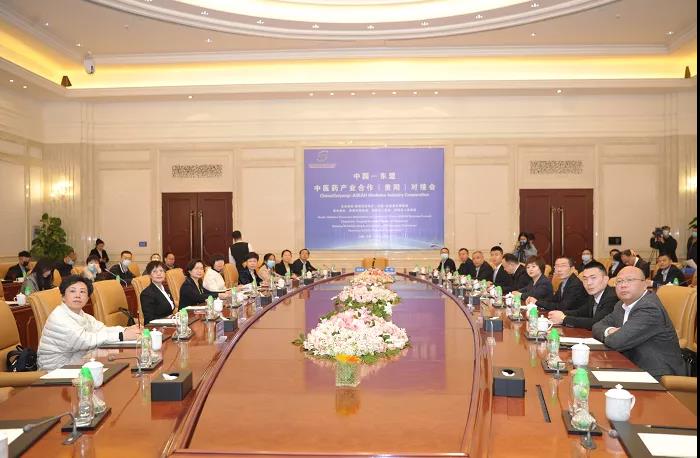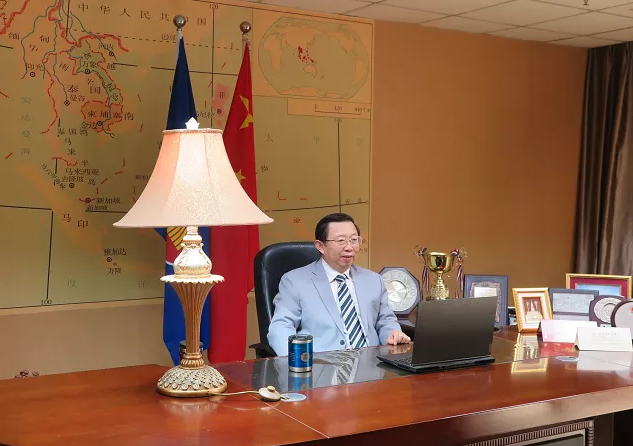China-ASEAN Medicine Industry Matchmaking Cooperation was Held

On March 25, 2021, the China-ASEAN Medicine Industry Cooperation Matchmaking Conference was held in the form of online and offline events. Xu Ningning, Executive President of the China-ASEAN Business Council, said that at present, the two sides should take the prevention and control of the pandemic as an opportunity, with the mission of safeguarding health, and work together to promote the cooperation and development of the Chinese medicine industry.
At the meeting, Xu Ningning mentioned in his speech that the two sides are highly complementary in economy and trade of Chinese medicine and related industries. In recent years, traditional medicine has become a key area of health cooperation between the two sides. In the fight against the pandemic in the past year, China has actively leveraged the unique advantages of traditional medicine, and produced medicines such as Taiji Huoxiang Zhengqi Oral Liquid, Jinhua Qinggan Granules, Lianhua Qingwen Capsules, Compound Ejiao Pu, etc., which have been presented or sold to some ASEAN countries.

Xu Ningning suggested that the consensus reached by the leaders and governments of both sides should be actively implemented, including the consensus of the China-ASEAN Health Ministers Meeting, the Action Plan for the Implementation of Joint Declaration on ASEAN-China Strategic Partnership for Peace and Prosperity (2021-2025) clearly requires: “According to the priority areas and domestic regulations of each country, the focus is on the protection, development of traditional medicine and complementary therapies, and the incorporate traditional Chinese medicine into the health care system to carry out cooperation". Combined with the theme of this year's China-ASEAN Sustainable Development Cooperation Year, the two parties can promote cooperation in the Chinese medicine industry as a sustainable development project. The two sides jointly leverage on the advantages of traditional medicine and demonstrate its value in international cooperation in fighting the pandemic and in building a community of human health.
Lv Kejian, former director general of the department of Asia Affairs of MOFMOC, said that the meeting was held at the right time. Traditional Chinese medicine helps prevent and control the pandemic. At present, it is a common need and a realistic choice to strengthen the cooperation between the Chinese medicine industry and enterprises of the two sides. The China-ASEAN Business Council, the organizer of the conference, has made contributions to this.
Lv Kejian said that the China-ASEAN Business Council has carried out a lot of work in promoting industrial cooperation between the two sides in the past 20 years. Among them, in 2016, the China-ASEAN Business Council took the lead in establishing the China-ASEAN Pharmaceutical Industry Cooperation Committee, which is composed of leaders of Chinese and ASEAN medical associations and well-known entrepreneurs. The committee is playing an active role in promoting cooperation between China and ASEAN pharmaceutical companies.
Chiyawan Chongvatana, Commercial Minister of the Royal Thai Embassy in China said that in recent years, the total trade volume between China and Thailand has continued to expand. China has been Thailand's largest trading partner for eight consecutive years, and Thailand is China's third largest trading partner among ASEAN countries. In the difficult period caused by the Covid-19 pandemic in 2020, the bilateral trade volume between China and Thailand reached 98.78 billion U.S. dollars, an increase of 7.67% over 2019. The "Regional Comprehensive Economic Partnership Agreement" is expected to enter into force at the end of this year. Free trade and multilateral cooperation will promote new developments in regional economic cooperation. In recent years, traditional Chinese medicine has gained more and more popularity and recognition worldwide, and Thai traditional medicine has also been widely recognized. China and Thailand continue to enhance cooperation in the field of Chinese medicine, and the prospects are promising.
Dr.Hj Kamaruddin Bin Dato Seri Paduka Hj Talib ,Former President of National Chamber of Commerce and Industry Brunei Darussalam, said that Brunei began using traditional medicine as early as the 14th century and has become part of the country's national and cultural heritage. Now, despite Brunei’s implementation of a free medical care system, the use rate of traditional medicines is still high, and traditional medicines can be bought in specialized stores and supermarkets. Brunei people have benefited from the modern medical system established by the government. However, using traditional medical care as supplementary medical care has played an important role in curing diseases and maintaining health. The Ministry of Health has incorporated traditional medicine into mainstream medical services in 2008. The production, import and sale of traditional medicines and health supplements do not require a license or pre-market authorization from the Brunei Drug Control Authority. Companies (ie importers, manufacturers and distributors) are responsible for ensuring the safety and quality of products.
Dr Kong Why Hong Secrectary General of Malaysian Chinese Medical Association, Malaysia has advantages in traditional and complementary medicine, and the use rate of traditional and complementary medicine is high. In 2008, Malaysia launched the first edition of the "GMP Guide for Traditional Medicine and Health Products". Traditional medicines that do not need to be registered in Malaysia include the following categories: one is non-toxic, unprocessed natural medicines, such as Chinese herbal medicine; the other is natural medicines that are simply processed, such as sun-dried, crushed, powdered or crushed; the third is traditional medicine used as a traditional food or food adjuvant, and its food label cannot be described as the therapeutic effect; the fourth is cosmetics and traditional medicine preparations that are washed or applied externally.
Charnchai Udomlarptham, Executive Director of Thai Pharmaceutical Manufacturers Association,said that Thailand is the second largest pharmaceutical market in ASEAN, and the acceptance of traditional Chinese medicine in Thailand is high. Thailand hopes to cooperate with China's Guizhou Province in traditional Chinese medicine. The Thai government especially hopes to build Thailand into an Asian medical center to attract foreign patients for medical tourism. In order to promote the development of biotherapy and biotechnology, the government has introduced relevant pharmaceutical policies to allow the pharmaceutical industry to create greater value.
During the meeting, Ran Li Deputy Director General of Guizhou Provincial Department of Commerce, Dou Qiling, President of Guizhou Pharmaceutical Industry Association and Chairman of Guizhou Yibai Pharmaceutical Co., LTD., and Liu Lisha, Director of the Guiyang Municipal Bureau of Commerce and President of China Council for the Promotion of International Trade Guiyang Sub-Branch delivered speeches respectively. And Song Xinyang, Executive Deputy Director of the International Development Research Center of Traditional Chinese Medicine, Shanghai University of Traditional Chinese Medicine, gave a special speech entitled "The Status and Prospects of the Development of Traditional Chinese Medicine in ASEAN". SHI KAI GE, President of Philippine Federation of Chinese Medicine Industry, introduced the prevention and control of Chinese medicine in the Philippines and the role of traditional Chinese medicine in the pandemic, representatives of the two sides actively interacted. CCPIT Guiyang Sub-Council and the Malaysian Medical Association signed a cooperation framework agreement.
Liu Xin, executive secretary general of the China-ASEAN Business Council, said when presiding over the meeting that leaders of the Chambers of Commerce and Industry of ASEAN countries, such as Malaysia, Vietnam, Laos, Cambodia, Indonesia, the Philippines, Thailand, Brunei, and the Association of Pharmaceutical Manufacturers participated actively in the meeting. All parties actively communicated and negotiated cooperation, which indicates that China-ASEAN cooperation in the traditional Chinese medicine industry is full of vitality.
The meeting was co-sponsored by the China-ASEAN Business Council and the Department of Commerce of Guizhou Province, China. The China-ASEAN Business Council invited more than 40 representatives from the embassies of relevant ASEAN countries in China, experts in the traditional Chinese medicine industry, representatives of the ASEAN industry associations and entrepreneurs to participate in the meeting through video, and communicate with the Chinese representatives.
【图文来源于网络,如有侵权,请联系我们删除】


